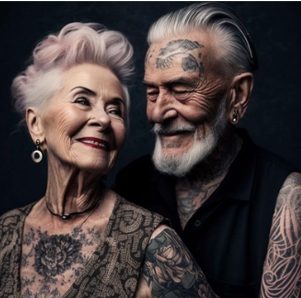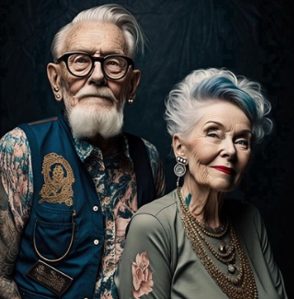
Aging gracefully is a journey marked by physical and emotional changes, and for many seniors, embracing unconventional forms of self-expression has become a transformative aspect of this process. In recent years, a remarkable trend has emerged, challenging stereotypes and empowering the elderly: tattoos for seniors. This article delves into the world of tattoos for the elderly, exploring how this unique form of self-expression is helping individuals navigate the complexities of aging while celebrating their individuality.
Tattoos as a Form of Self-Expression:
Tattoos have evolved from a rebellious statement embraced by the younger generation to a respected form of art and personal expression that transcends age. For seniors, tattoos serve as powerful symbols of self-identity, allowing them to communicate their life stories and passions. Whether it’s a nod to cultural heritage, a tribute to a loved one, or a symbol of personal resilience, tattoos provide a canvas for sharing the rich tapestry of seniors’ lives.
Breaking Free from Stereotypes:
Aging often comes with societal expectations and stereotypes. Tattoos offer a medium through which seniors can break free from these constraints and embrace their individuality. Far from conforming to conventional norms, older individuals use tattoos to make bold statements about their uniqueness and the diverse experiences that have shaped their lives.

These tattoos become more than just ink on skin; they are a celebration of a life well-lived, a testament to resilience, and a bold declaration of independence. Seniors are rewriting the narrative around aging, proving that advancing in years doesn’t mean a loss of identity but rather an opportunity for vibrant self-expression.
Enhancing Mental Well-being:
The process of getting a tattoo can contribute to the mental well-being of seniors. The experience provides an opportunity for self-reflection and a sense of control over one’s body and choices. It is a positive outlet for creative expression and a chance to engage in meaningful conversations with tattoo artists, family members, and peers.
The visible and permanent nature of tattoos can instill a sense of pride and confidence, contributing to improved self-esteem. As individuals age, maintaining a positive self-image becomes crucial, and tattoos offer a unique way to achieve this while fostering a sense of empowerment.
The Growing Trend:
The trend of seniors getting tattoos is on the rise, with many embracing the idea that age is not a limitation to self-expression. Tattoo studios are witnessing an increasing number of older clients seeking meaningful and symbolic ink. This cultural shift signifies a broader acceptance of the fact that one’s identity and desire for self-expression don’t diminish with age; in fact, they can become even more profound.

Conclusion:
Tattoos for seniors represent a celebration of individuality, resilience, and the diverse experiences that make up a lifetime. This rising trend showcases a cultural shift, challenging preconceived notions about aging and encouraging seniors to embrace their unique stories.
As seniors navigate the complexities of aging, tattoos emerge as a powerful tool for self-expression, fostering mental well-being, and breaking free from societal expectations. The inked narratives on aging bodies become a testament to the enduring spirit of individuality, proving that the journey through the golden years can be adorned with symbols of strength, resilience, and the rich tapestry of a life well-lived.





